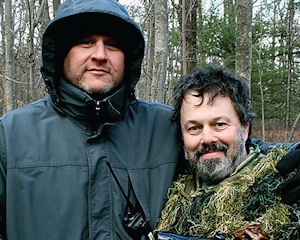Studio City filmmaker John Putch had a bigger budget for his second film in a planned trilogy set in rural Pennsylvania, but the same eccentric characters. “Route 30, Too,” his eighth independent feature film, is filled with UFO scientists, a randy real estate agent, deer hunters, strippers, a language-challenged convenience store clerk and other colorful locals. “I went full-on farce for this one,” said Putch, 51, who works completely outside of the big studio system. Putch has a day job as a director of episodic television of shows such as “Cougar Town,” Ugly Betty,” and “Scrubs.” The work provides funding for his films. He self-distributed “Route 30, Too” via limited theatrical runs and on DVD so that he and the cast can receive the revenue, not a distributor. Since September, Putch has screened “Route 30, Too” at film festivals, including the opening night of the 12th annual Valley Film Festival in North Hollywood in early November. In February, he will present the film for two nights in York, Pa. The film has been shown in limited runs in Chambersburg and Gettysburg, Pa. as well. Taking distribution into his own hands gives Putch a larger financial return than when he worked with sales agents and distribution companies. “I am tired of being ripped off,” Putch said. “I am not making movies for the money. I am making them for pleasure, and because of that I do not feel obligated to entrust a professional entity to distribute it.” ENTERTAINMENT – Mark Madler Putch shot the original “Route 30” on a $65,000 budget, and doubled that for the sequel. The added cost was needed for 125 special effects shots and for the principal cast of a dozen performers. When Putch made “Route 30,” which featured Dana Delany, back in 2008, it wasn’t his intention to make two more films. “When I premiered the first movie in Chambersburg I was asked if there would be a sequel and blurted out it was a trilogy,” Putch said. “I did not get to use story points in the first film and had left over stuff.” Putch is working on the script of the concluding film in the trilogy and expects to begin filming in spring 2014. FX of Unionization More than 70 entertainment industry professionals turned out for a panel discussion on unionization sponsored by the Visual Effects Society, a Sherman Oaks-based organization of visual effects artists around the globe. While the VES takes a neutral position on whether visual effects artists should form a union, the group has been vocal about improving working conditions and compensation. Films that rely on visual effects are among the most popular and highest grossing, yet FX houses in Los Angeles struggle or go out of business as they lose work to firms with lower cost structures in foreign countries. The Dec. 1 event at the Los Angeles Film School in Hollywood painted a picture of a local industry where the surviving companies have low profit margins and are willing to undercut each other to get work. Among the attendees was Scott Ross, who once headed Industrial Light & Magic, the visual effects division of Lucasfilm Ltd., and co-founded Digital Domain, the Venice studio that produced the effects for “Avatar.” Ross has been seeking to form a trade association so digital effects houses can handle their own workplace and compensation issues before unionization takes hold. He related how he recently approached top management of 15 visual effects firms to discuss the proposal, but the only ones to show interest were in the “second tier.” Ross, who once thought a visual effects union was not necessary, has since changed his mind. “A visual effects union might force management to come together to address the issues,” said Ross, who was an audience member. But panel member Ellen Shadur, an attorney in the Los Angeles office of law firm BakerHostetler, said that union representation could add 15 percent to 20 percent to a company’s expenses when such functions as union steward responsibilities and time spent collective bargaining and handling grievances is taken into consideration –enough to put some houses out of business. Steve Kaplan, another panel member and organizer for Animation Guild Local 839, disputed those numbers and said a cost analysis had to be completed. He also said that sometimes visual effects artists can be their own worst enemy, becoming so committed to producing quality work that they forget they have a business relationship with studios and their employer. Also participating in the panel were Bill Taylor, a cinematographer; John Parenteau, a visual effects supervisor and executive; and Scott Dougherty, owner of Furious FX Inc. in Burbank. The moderator was Marty Shindler, an entertainment industry consultant based in Encino. Staff Reporter Mark R. Madler can be reached at (818) 316-3126 or by e-mail at [email protected]
